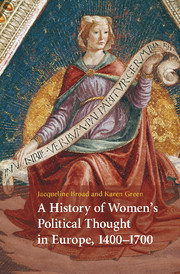Book contents
- Frontmatter
- Contents
- Preface
- Introduction
- 1 Christine de Pizan
- 2 Women of the Italian Renaissance
- 3 From Anne de Beaujeu to Marguerite de Navarre
- 4 Queen Elizabeth I of England
- 5 From the Reformation to Marie le Jars de Gournay
- 6 Women of the English civil war era
- 7 Quaker women
- 8 The Fronde and Madeleine de Scudéry
- 9 Margaret Cavendish, Duchess of Newcastle
- 10 Women of the Glorious Revolution
- 11 Women of late seventeenth-century France
- 12 Mary Astell
- Conclusion
- Bibliography
- Index
4 - Queen Elizabeth I of England
Published online by Cambridge University Press: 02 July 2009
- Frontmatter
- Contents
- Preface
- Introduction
- 1 Christine de Pizan
- 2 Women of the Italian Renaissance
- 3 From Anne de Beaujeu to Marguerite de Navarre
- 4 Queen Elizabeth I of England
- 5 From the Reformation to Marie le Jars de Gournay
- 6 Women of the English civil war era
- 7 Quaker women
- 8 The Fronde and Madeleine de Scudéry
- 9 Margaret Cavendish, Duchess of Newcastle
- 10 Women of the Glorious Revolution
- 11 Women of late seventeenth-century France
- 12 Mary Astell
- Conclusion
- Bibliography
- Index
Summary
Queen Elizabeth I (1533–1603) is one of the best-known political figures of England, but she is not generally studied as a political thinker. Commentators on Elizabeth's politics examine such topics as Elizabethan state and foreign policy, the internal politics of court and council, Elizabeth's various conflicts with parliament about marriage and the succession, and the conscious construction of the queen's public persona. Few scholars attempt to define Elizabeth's abstract political thought or the political ideas espoused in her speeches, letters, prayers, and poems. When Elizabeth's writings are studied, they are studied first and foremost as the productions of an important historical figure, rather than those of an intellectual; and scholars concentrate on what Elizabeth's speeches do, rather than merely what they say. If one looks closely, however, it is possible to discern a distinctive political outlook in Elizabeth's written pieces. Generally speaking, her political thought is representative of a standard sixteenth-century view that princely authority is ultimately founded in God, and that active rebellion against an anointed prince constitutes unlawful rebellion against divine authority.
For a few feminist theorists, it is disappointing that Elizabeth simply promotes the masculine values of the patriarchal order that she represents, and that she does not subvert that tradition, or make any attempt to further the status of women as a social class.
- Type
- Chapter
- Information
- A History of Women's Political Thought in Europe, 1400–1700 , pp. 90 - 109Publisher: Cambridge University PressPrint publication year: 2009

